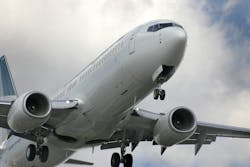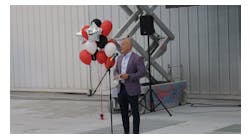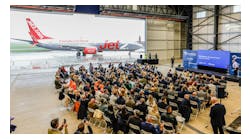Are New Fleet-related Trends More Than the MRO Industry Can Handle?
Currently the order backlogs of the two major OEMs, Boeing and Airbus, are at record 5 100 and 5 500 respectively. With this in regard, the global fleet is expected to shed 4-5% of its airframes annually to absorb the backlogs and near-term production rates that the manufacturers have lined up. However, recently the widespread traffic growth has in fact been helping to cut into the parked fleet instead.
According to IATA, this June global revenue passenger kilometres grew 4.7% and available seat kilometres were up 5%, with every world region adding traffic. While this is a slight weakening on May’s performance, the steady rise in air travel demand has resulted in more and more operators pulling aircraft out of storage, particularly current generation narrowbodies with a decade or more of life left.
Thus, at the end of May the parked fleet totalled approximately 2 573, which is down 2% from April and 7% from the same time a year ago. The figure, which is about 10% of the total global Western-build airline fleet, includes 706 aircraft that are 15 years or younger. Parked large passenger aircraft are 8% lower from the past year, while parked freighters are 13% lower.
“The reductions are driven largely by returns to service of A320 and 737NG family models. In particular, the number of parked A320s recently fell 22% year-over-year, to 159 aircraft, while the parked 737NG fleet declined 7%, to 65 aircraft. And there are reasons to believe the trend will continue,” shares Kestutis Volungevicius, the Head of FL Technics Training. “However, the big question is, whether the existing workforce supply is sufficient to handle such increasing work volumes.”
Due to rapidly increasing demand for heavy maintenance of popular narrowbodies, the MRO industry is equivocal about the actual capacity it can offer, especially as concerns adequate supply of qualified workforce to handle the work. Between 2002 and 2013 there was significant expansion of the fleets, especially in the developing world, and these aircraft are already putting significant pressure on the MRO segment. Modifications pick back up and the high number of deliveries of the early 2000s return for their second round of heavy visits, while the 2005-2009 and 2010-2014 deliveries begin their first round of heavy maintenance visits, driving a CAGR of almost 4% by 2023.
In addition, it appears that the retirement trend has also slowed its pace. According to Aviation Week, 589 aircraft were scrapped from June 2013, including 413 large passenger aircraft, 118 freighters, and 58 regional jets. The 12 months ended May 30 saw 70 aircraft 20 years and younger scrapped, compared to 82 in the previous 12 months, the report states.
“Western European MROs are already reporting a challenging hiring environment, with 39% finding “few” candidates, even with intense recruiting efforts. In addition, in 2014 the long-feared workforce transition is also finally expected to begin. The overall rate of technical personnel eligible to retire should reach 9.6% this year, followed by 11.3% in 2015 and 13.3% in 2016,” says the Head of FL Technics Training. “Add this to a demand for 584 000 new commercial airline maintenance technicians by 2033, and it becomes obvious that while the returning aircraft might pose less of a threat in terms of personnel re-training, the industry is still up for a challenge.”
About FL Technics Training:
FL Technics Training is a provider of technical training for the aviation industry. The company offers comprehensive training services including basic training and examination, aircraft type training and specialized training for aircraft maintenance technicians as well as administrative and management personnel. FL Technics Training is part of an integrated aircraft maintenance and repair organization (MRO) FL Technics.
Based in Viln
FL Technics Training offers specialized training programs of general interest for technical as well as administrative personnel from Engineering and Planning, Quality system, EASA Regulation Part-145 and Part-M to Fuel Tank Safety courses. Training programs can be adapted to meet the specific needs and requirements of clients.
More than 3000 students for over 45.000 hours per year are trained at the company's theoretical courses in Moscow, Tyumen, Alma Ata, Vilnius and London. Training on the job is executed in Vilnius, Kiev and London.
For further information please visit website http://www.fltechnicstraining.com/



